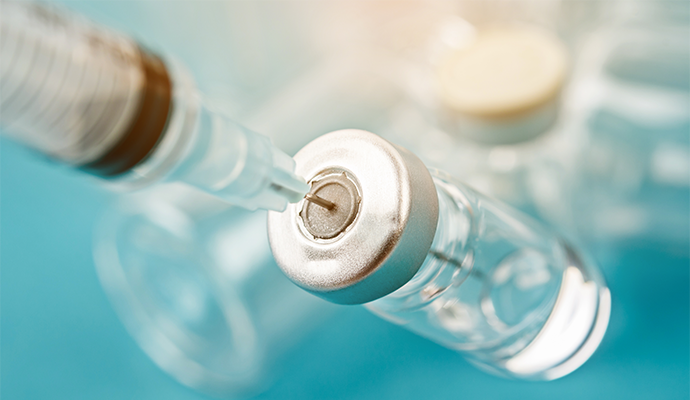Pfizer Reports Positive Results for Potential COVID-19 Vaccine
Pfizer and BioNtech’s clinical trial found that its most promising investigational vaccine candidate could be administered in a dose that was well-tolerated by infected patients.

Source: Getty Images
- Pfizer and BioNTech recently announced positive preliminary data from an ongoing Phase 1/2 study of the most advanced COVID-19 vaccine candidate in their BNT162 mRNA-based vaccine program.
For more coronavirus updates, visit our resource page, updated twice daily by Xtelligent Healthcare Media.
The preliminary data found that investigational vaccine candidate, BNT162b1, could be administered in a dose that was well tolerated and generated dose dependent immunogenicity.
“We are encouraged by the clinical data of BNT162b1, one of four mRNA constructs we are evaluating clinically, and for which we have positive, preliminary, topline findings,” Kathrin U. Jansen, PhD, senior vice president and head of vaccine research and development at Pfizer, said in the announcement.
“We are dedicated to develop potentially groundbreaking vaccines and medicines, and in the face of this global health crisis, we approach this goal with the utmost urgency. We look forward to publishing our clinical data in a peer-reviewed journal as quickly as possible.”
The ongoing Phase 1/2 randomized, placebo- controlled study evaluated the safety and immunogenicity of escalating dose levels of BNT162b1 in 45 healthy adults aged 18 to 55 years of age.
Participants received two doses, 21 days apart, of placebo,10 µg or 30 µg of BNT162b1, or received a single dose of 100 µg of the vaccine candidate.
Twenty-four participants received two injections of 10 µg and 30 µg, 12 participants received a single injection of 100 µg, and nine participants received two doses of placebo control, Pfizer said.
According to Pfizer, the highest amount of antibodies present were found seven days after the second dose of 10 µg or 30 µg on Day 28 after vaccination. The neutralizing geometric mean concentration (GMC), or average antibody concentration, were 168 and 267 for the 10 µg and 30 µg dose levels, respectively.
At Day 21 after a single injection, the 12 subjects who received 100 µg had an RBD-binding IgG GMC of 1,778 units and a neutralizing GMT of 33.
At the 10 µg and 30 µg dose levels, adverse reactions included low grade fever and were more common after the second dose than the first.
The most common reaction reported, however, was injection site pain, which was mild to moderate. No serious adverse events were reported.
Pfizer stated that the two companies will determine appropriate dosage level be leveraging preliminary data, along with additional preclinical and clinical data currently being generated.
Additionally, Pfizer and BioNtech will select among multiple vaccine candidates to seek to progress to a large, global Phase 2b/3 safety and efficacy trial.
The trial, which will include nearly 30,000 healthy adults, is expected to begin in late July 2020.
If the ongoing studies are successful and the vaccine candidate receives regulatory approval, BioNTech and Pfizer pledged to manufacture up to 100 million doses by the end of 2020 and potentially more than 1.2 billion doses by the end of 2021, Pfizer said.
“These preliminary data are encouraging in that they provide an initial signal that BNT162b1 targeting the RBD SARS-CoV-2 is able to produce neutralizing antibody responses in humans at or above the levels observed in convalescent sera – and that it does so at relatively low dose levels. We look forward to providing further data updates on BNT162b1,” said Ugur Sahin, MD, CEO and co-founder of BioNTech.
The BNT162 program is evaluating nearly four experimental vaccines that all individually represent a combination of mRNA format and target antigen.
After announcing that, they signed a letter of intent to co-develop and distribute potential coronavirus vaccines in March. Pfizer and BioNtech disclosed additional details on their vaccine development plans through BioNTech’s and mRNA vaccine program in mid-April.
Under the terms of agreement, Pfizer paid BioNTech $185 million in upfront payments, including a cash payment of $72 million and an equity investment of $113 million.
Pfizer agreed to fund 100 percent of the development costs and BioNTech will repay Pfizer its 50 percent share of these costs during the commercialization of the vaccines.
